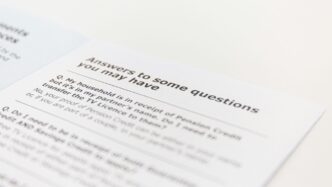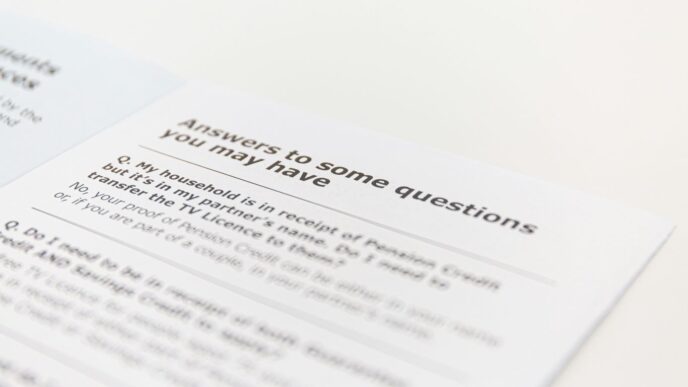Jumping into your first HR interview can feel like a big step. That’s why we’ve rounded up the top 12 interview questions for hr freshers with answers to help you walk in with more confidence. You’ll get simple sample replies, real-life examples, and a clear idea of what hiring managers expect. Let’s keep it straightforward and practical so you can focus on being yourself.
Key Takeaways
- Craft a brief, honest intro that links your background to HR.
- Choose one real strength and one weakness, and explain how you’re improving.
- Study the job description and weave key HR duties into your replies.
- Use simple stories to show how you handled conflict or led a small team.
- Show you value privacy by explaining how you’d protect sensitive info.
1. Tell Me About Yourself
Okay, so this is like, the classic interview opener, right? It’s basically your chance to make a solid first impression. Don’t just ramble about your life story, though. Think of it as a mini-commercial for you, the HR fresher.
Here’s how I’d approach it:
- The Hook: Start with a quick intro – name, maybe where you’re from originally. Keep it super brief.
- The Background: Mention your education, especially anything HR-related. Did you major in HR, business, or something similar? Any relevant certifications? This is where you show you’ve got the HR background.
- The Skills: Highlight a few key skills that match the job description. Think communication, organization, problem-solving, maybe even some tech skills if you have them. Give examples if you can! "I’m really good at organizing events, like when I planned the volunteer day for my university club."
- The Personality: Throw in a tiny bit about your interests outside of work. This makes you seem like a real person, not just a robot. Maybe you’re into hiking, reading, or volunteering. Keep it professional, though!
- The Enthusiasm: End by saying you’re excited about the opportunity and eager to learn more about the company. Show them you’re genuinely interested.
Basically, you want to give them a snapshot of who you are, why you’re qualified, and why you’re excited about the job. Keep it concise, keep it positive, and keep it focused on what you can bring to the table.
2. What Are Your Strengths And Weaknesses
This is a classic interview question, and it’s your chance to shine (and show some self-awareness!). Interviewers aren’t necessarily looking for perfection; they want to see that you understand yourself and how you can contribute to the team. It’s all about framing your answer in a way that highlights your potential and willingness to grow.
The key is to be honest but strategic. Don’t just rattle off a list of generic strengths and weaknesses. Instead, choose a few that are relevant to the HR role and explain them with specific examples. For weaknesses, focus on areas where you’re actively working to improve. This shows initiative and a growth mindset. It’s also a good idea to tie your strengths back to the job description, demonstrating how your skills align with the company’s needs. For example, if the job requires strong communication skills, highlight your ability to build relationships and resolve conflicts effectively. If you are looking for strengths in an interview, consider your attributes and frame them in a concise answer.
Here’s a general approach you can take:
- Strengths: Identify 2-3 strengths that are relevant to the HR role. Provide specific examples of how you’ve demonstrated these strengths in the past. Quantify your accomplishments whenever possible.
- Weaknesses: Choose one weakness that is genuine but not a critical flaw for the job. Explain what steps you’re taking to improve in this area. Frame it as an opportunity for growth.
- Balance: Make sure your strengths outweigh your weaknesses. Spend more time discussing your strengths and how they can benefit the company.
Think of it as a chance to showcase your self-awareness and your commitment to continuous improvement. It’s not about being perfect; it’s about being real and showing that you’re the right fit for the team. If you are not satisfied with your performance, it is important to set realistic goals and communicate with the team.
3. Why Do You Want To Pursue A Career In Human Resources
Okay, so you’re sitting in the interview hot seat, and they hit you with the classic "Why HR?" question. This isn’t just small talk; they want to know what genuinely sparks your interest in the field. Are you just looking for a job, or are you actually passionate about people and organizational development?
Think about what really draws you to HR. Is it the chance to help employees grow? Maybe you’re fascinated by the legal side of things, or perhaps you thrive on solving workplace conflicts. Whatever it is, make sure your answer is authentic and shows that you’ve put some thought into your career path.
HR is more than just hiring and firing; it’s about building a positive and productive work environment. It’s about making sure employees feel valued, supported, and have the resources they need to succeed. If you can convey that understanding and enthusiasm, you’ll be in good shape.
Here’s the thing: companies need HR to run smoothly. They need someone to handle workforce management software, navigate employee relations, and ensure compliance. If you can show that you understand the importance of HR and that you’re eager to contribute, you’ll make a strong impression.
4. What Do You Understand By The Role Of An HR Professional
When you’re asked about your understanding of the HR role, interviewers want to gauge your grasp of the function’s breadth and depth. They’re checking if you see HR as more than just hiring and firing. They want to know if you understand its strategic importance.
Essentially, they want to know if you get what HR is all about.
Think about it this way: HR isn’t just about paperwork; it’s about people, and how those people drive the company forward. It’s about creating a positive work environment, ensuring compliance, and helping employees grow. It’s a multi-faceted role that touches every part of the organization.
Here’s a breakdown of what you might want to include in your answer:
- Talent Acquisition: This is more than just posting jobs. It’s about finding the right people who fit the company culture and have the skills needed to succeed. It involves sourcing, screening, interviewing, and onboarding.
- Employee Relations: This involves managing relationships between employees and the company. It includes conflict resolution, addressing grievances, and ensuring fair treatment for all.
- Compensation and Benefits: This is about making sure employees are paid fairly and have access to benefits that meet their needs. It involves researching market rates, designing benefit packages, and administering payroll.
- Training and Development: This is about helping employees grow and develop their skills. It involves identifying training needs, designing training programs, and delivering training sessions.
- Compliance: This is about ensuring that the company complies with all applicable laws and regulations. It involves staying up-to-date on employment laws, developing policies and procedures, and conducting audits.
Consider this example: "I see the HR professional as a key partner in achieving organizational goals. They are responsible for attracting, developing, and retaining talent, while also ensuring a positive and compliant work environment. They act as a bridge between employees and management, fostering open communication and resolving conflicts. Ultimately, they contribute to the company’s success by ensuring that it has the right people in the right roles, with the skills and support they need to thrive."
Remember to tailor your answer to the specific company and role you’re applying for. Do your research and show that you understand their needs and challenges. For example, you can mention how AI tools can streamline resume screening. Good luck!
5. How Do You Handle Conflict In The Workplace

Conflict is pretty much inevitable, right? Especially when you’re dealing with different personalities and work styles. As an HR fresher, showing you have a solid approach to conflict resolution is key. It’s not about avoiding disagreements, but about managing them constructively. The goal is to find a solution that works for everyone involved and maintains a positive work environment.
Think about it: unresolved conflicts can lead to decreased productivity, low morale, and even legal issues down the line. So, being able to step in and mediate is a super important skill for any HR professional. When answering this question, it’s good to show you understand the different stages of conflict resolution and that you’re able to adapt your approach based on the situation. You want to show you can listen actively, empathize with different perspectives, and facilitate a fair and respectful discussion. It’s also important to demonstrate that you can maintain confidentiality and objectivity throughout the process. Here’s how I’d approach it:
- Active Listening: Really hear what each person is saying. Don’t just wait for your turn to talk. Pay attention to their body language and tone of voice, too.
- Empathy: Try to see things from their point of view. Even if you don’t agree, understanding where they’re coming from can help you find common ground.
- Mediation: Facilitate a discussion where everyone feels heard and respected. Help them identify the core issues and brainstorm solutions together.
- Confidentiality: Assure everyone that the discussion will remain private. This builds trust and encourages open communication.
- Objectivity: Remain neutral and unbiased. Focus on the facts and avoid taking sides.
For example, you could talk about a time you helped resolve a disagreement between team members on a group project. Maybe they had different ideas about how to approach the project, and tensions were rising. You stepped in, listened to both sides, and helped them find a compromise that incorporated elements of both ideas. The key is to show that you can turn a potentially negative situation into a positive learning experience for everyone involved. You can also talk about how you would handle a complaint from a staff member about someone more senior. Managing conflict is an integral part of any HR role.
6. Describe A Time You Demonstrated Leadership
This question is all about showing you can take charge and guide others, even without a formal leadership title. Interviewers want to see if you have the potential to step up and inspire a team. Think about times you’ve motivated people, resolved conflicts, or taken initiative to improve a situation. It’s not just about being in charge; it’s about influencing and supporting others to achieve a common goal.
Consider using the STAR method (Situation, Task, Action, Result) to structure your answer. This helps you provide a clear and concise narrative that highlights your leadership skills. Don’t be afraid to talk about challenges you faced and how you overcame them. It shows resilience and problem-solving abilities, which are key leadership qualities.
Here’s how you can approach this question:
- Choose a specific example: Don’t be vague. Pick a situation where you clearly demonstrated leadership.
- Highlight your actions: Focus on what you did, not just what happened. What steps did you take to lead the team or resolve the issue?
- Quantify the results: If possible, use numbers to show the impact of your leadership. Did you increase productivity, improve morale, or reduce costs?
For example, maybe you led a project team where there were disagreements about the direction. You could describe how you facilitated discussions, helped the team find common ground, and ultimately guided them to a successful outcome. Or perhaps you noticed a problem with a process and took the initiative to propose and implement a solution. These are all great examples of demonstrating leadership.
Think about a time you helped improve employee engagement at work. What did you do? How was this achieved?
7. How Do You Prioritize And Manage Multiple Tasks
Okay, so this is a big one. HR roles, especially for freshers, often involve juggling a bunch of different things at once. It’s not just about knowing how to do something, but also when and why you’re doing it. They want to see if you can handle the chaos without losing your cool.
The key here is to show you have a system. It doesn’t have to be perfect, but it needs to be something that works for you.
- Explain your method: Do you use a planner? A digital tool? A sticky note system that only you understand? Walk them through it.
- Give an example: Talk about a time you had to manage multiple deadlines or projects. What did you do first? How did you decide what was most important? What was the outcome?
- Be honest about challenges: Everyone struggles sometimes. If you’ve ever missed a deadline or had to ask for help, talk about it. What did you learn from the experience? How did you adjust your approach moving forward?
Think about it like this: they’re not just asking if you can do the work, but if you can do it efficiently and effectively. They want to know you can handle the pressure and still deliver results. For example, using candidate assessments can help prioritize candidates during recruitment.
Here’s a simple example of how I might structure my day:
| Time | Task | Priority | Notes |
|---|---|---|---|
| 9:00 – 10:00 | Respond to emails | High | Address urgent requests first. |
| 10:00 – 12:00 | Work on employee handbook update | Medium | Focus on policy revisions. |
| 1:00 – 2:00 | Schedule interviews | High | Confirm times with candidates. |
| 2:00 – 4:00 | Review benefits enrollment materials | Low | Prepare for upcoming open enrollment period. |
8. How Do You Stay Updated With HR Trends And Employment Laws
This is a really important question because HR is always changing. You can’t just learn something once and be done with it. You need to show that you’re committed to continuous learning and staying on top of things. It’s not enough to just say you read articles; you need to show you understand the implications of those changes.
Here’s how I’d approach this question:
- Mention specific sources: Don’t just say "I read HR blogs." Name a few reputable sources like SHRM, HR Dive news and analysis, or specific industry newsletters. This shows you’ve done your homework and know where to find reliable information.
- Talk about professional development: Do you attend webinars, conferences, or workshops? Are you pursuing any certifications? These are great ways to demonstrate your commitment to learning.
- Discuss networking: Do you connect with other HR professionals online or in person? Sharing insights and experiences with peers is a valuable way to stay informed.
- Give examples of how you’ve applied new knowledge: Have you implemented a new policy based on a recent legal change? Have you adjusted your recruitment strategy based on current trends? Sharing concrete examples shows you’re not just passively consuming information, but actively using it.
For example, you could say something like: "I actively follow updates from SHRM and regularly read articles on employment law changes. Recently, I attended a webinar on the latest updates to FMLA regulations and shared the key takeaways with my team. I also participate in an online HR forum where we discuss emerging trends and best practices."
9. Describe A Challenging Situation You Faced And How You Resolved It
This question is all about seeing how you handle pressure and problem-solving. Interviewers want to know if you can think on your feet and come up with effective solutions. Don’t be afraid to get specific and show off your skills!
Think about a time when things didn’t go as planned. Maybe a project went sideways, a team member wasn’t pulling their weight, or you had to deal with a difficult client. The key is to focus on how you handled it, not just what happened.
Here’s how to structure your answer:
- The Situation: Briefly describe the challenge. What was the problem? Who was involved? What were the stakes?
- Your Actions: What steps did you take to address the situation? Did you brainstorm solutions? Did you seek advice from others? Did you have to make a tough decision?
- The Result: What was the outcome? Did you successfully resolve the problem? What did you learn from the experience? Even if the outcome wasn’t perfect, focus on the positive lessons you took away.
For example, I once had to manage a project where the client kept changing their requirements. It was incredibly frustrating, and it caused a lot of delays. To combat this, I scheduled a meeting with the client to clarify their expectations and establish a clear scope for the project. I also implemented a change management process to ensure that any future changes were properly documented and approved. It was still a stressful experience, but in the end, the client was happy with the final product, and I learned the importance of clear communication and project management.
Here are some questions to consider when preparing your answer:
- What made the situation challenging?
- What skills did you use to overcome the challenge?
- What would you do differently next time?
10. How Do You Maintain Confidentiality With Sensitive Employee Information

This is a big one. Companies need to know they can trust you with employee data. Think salaries, performance reviews, medical info – it’s all super private. You need to show you get that and have a plan for keeping things under wraps.
Here’s how I’d approach this question:
- Acknowledge the Importance: Start by saying you understand how vital confidentiality is in HR. Make it clear you know you’d be dealing with sensitive stuff.
- Outline Your Practices: Talk about specific steps you’d take. This could include:
- Using secure systems and following company protocols for data storage.
- Being careful about what you discuss and where (no talking about employee issues in public!).
- Shredding documents with personal information.
- Limiting access to information on a need-to-know basis.
- Mention Ethics: Say you’re committed to ethical behavior and understand the legal implications of mishandling data. It shows you take it seriously.
- Give an Example (If Possible): If you have a past experience where you maintained confidentiality (even if it wasn’t HR-related), share it. It makes your answer more believable. For example, you could talk about maintaining confidentiality in a previous role, even if it was just keeping customer information safe. This demonstrates your understanding of data analysis and its importance.
Basically, you want to reassure them that you’re trustworthy and understand the gravity of the situation. It’s not just about following rules; it’s about respecting people’s privacy.
11. How Will You Handle A Difficult Candidate During Recruitment
Dealing with difficult candidates is part of the job. It’s not always sunshine and rainbows. You’ll encounter candidates who are aggressive, unprepared, or simply not a good fit but refuse to accept it. Here’s how I’d approach it:
- Stay Calm and Professional: This is rule number one. No matter how frustrating the candidate becomes, maintaining a calm and professional demeanor is key. It reflects well on the company and helps de-escalate the situation.
- Active Listening: Let the candidate express their concerns or frustrations. Sometimes, just being heard can make a big difference. Show that you’re paying attention and understanding their point of view. This can involve summarizing their points to ensure you understand correctly.
- Set Clear Boundaries: If a candidate becomes disrespectful or uses inappropriate language, it’s important to set boundaries. Clearly and politely state that such behavior is unacceptable and will not be tolerated. You might say something like, "I understand you’re frustrated, but I need you to speak respectfully."
- Focus on Facts and Job Requirements: Steer the conversation back to the job requirements and the candidate’s qualifications. Avoid getting drawn into personal arguments or irrelevant discussions. Stick to objective criteria and provide constructive feedback.
- Document Everything: Keep a detailed record of the interaction, including the date, time, and specific issues that arose. This documentation can be helpful if further action is needed.
Remember, the goal is to treat every candidate with respect, even when they’re being difficult. It’s about representing the company well and ensuring a fair and professional recruitment process. Sometimes, a difficult candidate is simply nervous or unsure of themselves, and a little empathy can go a long way. Other times, they’re genuinely not a good fit, and it’s important to handle the situation with tact and firmness. It’s also important to research candidate priorities to ensure a smooth recruitment process.
12. Where Do You See Yourself In Your HR Career Five Years From Now
This question is all about showing your ambition and how well your goals line up with the company’s. Interviewers want to know you’re thinking long-term and that you’re serious about growing with them. It’s a chance to paint a picture of your future self and how you plan to contribute to their organization. Don’t be afraid to be specific, but also show you’re adaptable and open to new opportunities.
Think about the skills you want to develop, the roles you aspire to, and the impact you want to make. It’s not just about climbing the ladder; it’s about becoming a more effective and strategic HR professional.
Here’s how to approach it:
- Research the company’s growth plans: Understanding where the company is headed helps you align your goals with theirs.
- Highlight your key skills: Mention the skills you want to improve and how they will benefit the company.
- Show your commitment: Express your desire to stay with the company long-term and contribute to its success.
For example, you could say something like: "In five years, I see myself as a senior HR manager, leading a team and driving key initiatives in employee engagement and talent development. I’m particularly interested in HR director roles and contributing to the company’s strategic goals."
## Conclusion
Looks like you’ve covered the top 12 questions and seen how you might answer them. Now take a minute to run through those answers out loud. Do it in front of a mirror or ask a buddy to listen. That way you’ll catch weird pauses or phrases that trip you up. Keep each answer short and honest. Share what you did, what you learned, and move on. Sure, nerves might kick in. That’s okay. A small tremor in your voice just means you care. Then head into that interview ready to chat—kind of like you’re talking with a future coworker. Be yourself, don’t overthink it, and remember: this is just a first step. Good luck, you’ve got this!
Frequently Asked Questions
How should I get ready for my first HR interview?
Start by learning about the company and the job role. Read the job ad carefully. Practice common HR questions out loud. Dress neatly and arrive on time. A little prep goes a long way.
What skills do HR managers want to see in freshers?
They look for clear speaking, good listening, and caring for others. Being on time, honest, and able to work in a team also helps. Show real examples to prove you have these skills.
How do I speak to HR during an interview?
Be polite and friendly. Listen to the questions and answer them fully but not too long. Keep a calm tone and make eye contact. Ask your own questions at the end to show you care.
How can I show I really want a career in HR?
Talk about what made you choose HR, like helping people or sorting out problems. Mention any clubs, classes, or online courses you took. Show that you’ve thought hard about this path.
What should I do if I don’t understand a question?
It’s okay to ask for more details. You can say, “Could you please explain that part?” This shows you want to give the right answer instead of guessing.
What are common mistakes to avoid in HR interviews?
Don’t talk too much or too little. Stay on topic and be honest. Avoid badmouthing past teachers or classmates. And never show up late or unprepared.














